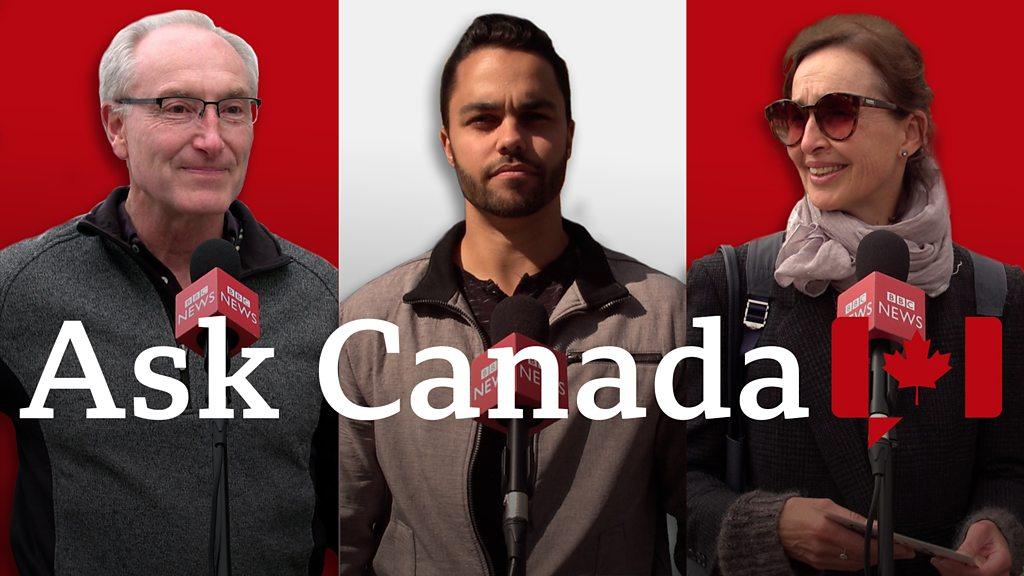Canada election: Your questions answered
- Published
What do Canadians think of Trudeau's record?
Canadian Prime Minster Justin Trudeau is up for re-election on 21 October, along with 337 other members of Canada's parliament.
We answer a sample of readers' questions about the federal election.
Do you think Canadians will say adieu to Justin Trudeau?
It really is just too close to call.
As of Friday morning, opinion polls show this race will be incredibly tight. Most pollsters are predicting a minority government led by either the Liberals or the Conservatives.
If the Liberals do lose the government, it would be a historic defeat, just four years after a remarkable comeback, when they leapfrogged from third place in the House of Commons to a majority victory.
What is known of Trudeau's reputation in the UK?
Canadian political leaders don't usually make a splash internationally, but Justin Trudeau has had all eyes on him since he was elected in 2015.
His face has graced the cover of Rolling Stone, and he and his wife got a fashion spread in American Vogue. In the UK, his private audience with the Queen was well-covered by the BBC and other media outlets.
Canadian Prime Minster Justin Trudeau looked back on the Queen's reign as the head of the Commonwealth, which the Queen joked ''made her feel so old"
In the beginning, most people in the UK were charmed by his youth, his colourful socks and his aptitude for a selfie. He was especially popular with liberals abroad, who viewed him as an anti-Trump and a stable ally for Britain.
But as scandals - notably the SNC-Lavalin affair and the revelation that he has worn blackface - derailed his reputation at home, so too did his star begin to fade abroad.
How much influence do backbenchers have in parliament?
That entirely depends on their party and party leader. They can introduce legislation or motions that matter to their particular constituents, but they are usually forbidden to challenge key elements of part doctrine.
Some party leaders, like Mr Trudeau and former PM Stephen Harper, have kept a tight leash on what their backbenchers can or cannot say. Mr Trudeau made waves when he said he would not allow any MP to remain in Liberal caucus if they are not pro-choice.
This matter was brought up during the election, because Conservative leader Andrew Scheer said he would allow backbenchers to vote with their conscience, which seemed to open the door for a backbencher to re-open the abortion debate, which the party says it would not do.
Why don't Canadians have a vote for PM as well as local riding representative?
Canada models its government after the UK's Westminster system of parliament. That means that Canada has both a head of state (the Queen, and in her absence the Governor General) and a head of government, the prime minister.
In countries like the US, that elect their leader directly, the president is both head of state and head of government.
At election time, voters vote for their local representatives in the House. If a party gets a majority of seats, than the leader of that party becomes the prime minister.
If one party does not get a majority, then the leader of the party that can get the confidence of the House becomes prime minister.
Are coalitions common in Canada?
Canada has had many minority governments, but very few coalitions.
Usually, a party that wins a minority of seats governs by persuading members in other parties to vote with their legislation. The longest uninterrupted minority lasted 937 days, between 2006-2008, under the government of Stephen Harper's Conservatives.
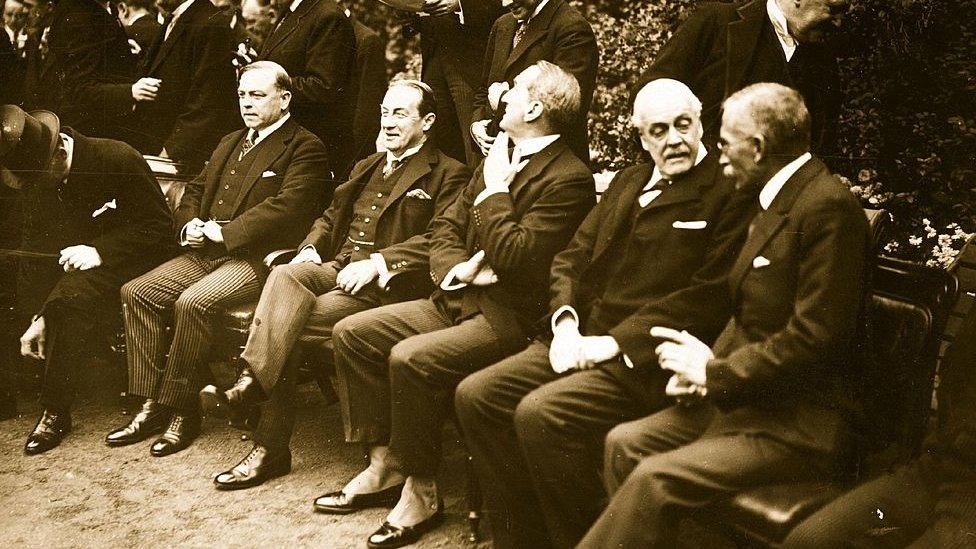
William Lyon MacKenzie King (far left) attends the Imperial Conference in London
Coalitions are much rarer. In 1925, PM William Lyon McKenzie King lost his seat and the Liberal Party lost first place in seats in parliament. But he was invited by the governor general to form a government because he gained the support of a third party, the Progressives.
Although the alliance allowed him to remain in power, it was technically not a coalition, since members of the Progressives were not in cabinet. The government lasted for less than a year.
A similar scenario could happen this time, if the Conservatives were to gain the most seats, but Mr Trudeau could get the support of other parties.
Conservative leader Andrew Scheer has said that "modern convention" dictates Mr Trudeau would have to resign. But NDP leader Jagmeet Singh has said he would consider forming a coalition with the Liberals if the Conservatives were to win.
Do Canadians tend to vote tactically?
Tactical voting is very common during Canadian elections. Voters might prefer a third party, but support the party they believe has the most chance to form a government, or to defeat a party they dislike.
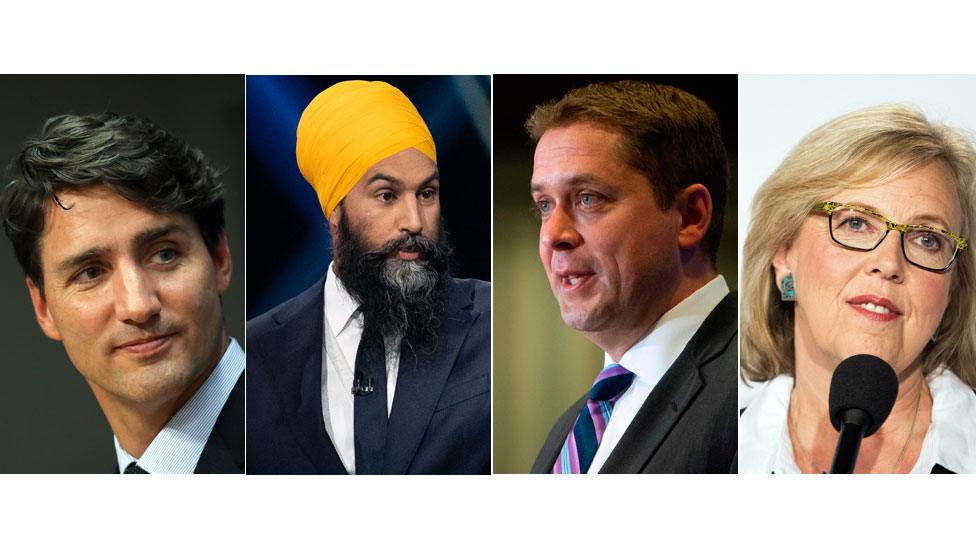
This election, Mr Trudeau has been trying to encourage tactical voting, arguing that a vote for any party but the Liberal Party would mean the Conservatives would get in power. This could be a persuasive argument for progressives who are more inclined to support the NDP or Green parties, but fear a Conservative government.
"In terms of the NDP and the Greens, remember this: If you want progressive action, you need a progressive government, not a progressive opposition," Trudeau said.
Could you explain Canadians' concerns with healthcare since some in the US want single-payer healthcare?
Healthcare is a major issue for Canadian voters - an October survey of 2,562 Canadians conducted by Ipsos found that healthcare was the top concern for 35% of voters.
While all Canadians have access to necessary medical services, the quality and level of care can vary, and many are concerned about how government policies will affect their care going forward.
Wait times for non-emergency medical treatment, access to family doctors and availability of doctors in rural areas are all concerns for the current healthcare system.
There is also currently a big divide over how much governments should provide, and how much Canadians should be able to access in the private sector.
Currently, governments cover necessary healthcare for everyone, but few get public dental or drug benefits. Both the NDP and Green Party are promising a national pharma care plan, while the Liberal Party says it will work to cut the cost of prescriptions.
The Conservative Party is promising to buy more MRI and CT machines, which they say will cut down on wait times.
How many Canadians abroad will be voting and could that be decisive anywhere?
About 51,000 Canadians living abroad are registered to vote, according to Elections Canada, about triple the number from the 2015 election.
Just under half live in the United States.
That signals a huge increase, but Canadians voting abroad still only counts for about .04% of the total population.
Outside Quebec and New Brunswick, where is a francophone dimension important to voters?
There are just over seven million French speakers in Canada, and about 87% of them live in the province of Quebec.
But there are significant French minority communities across the country, especially in places like Sudbury, Ontario, Calgary, Alberta, and parts of Nova Scotia and Prince Edward Island.
In these communities, which are surrounded by an Anglophone majority, the ability to access services in French is an ongoing concern.
Is there anywhere immigrants can play a decisive role?
There are about 5.6 million foreign-born Canadian citizens, or about 17.5% of the country's total citizenship.
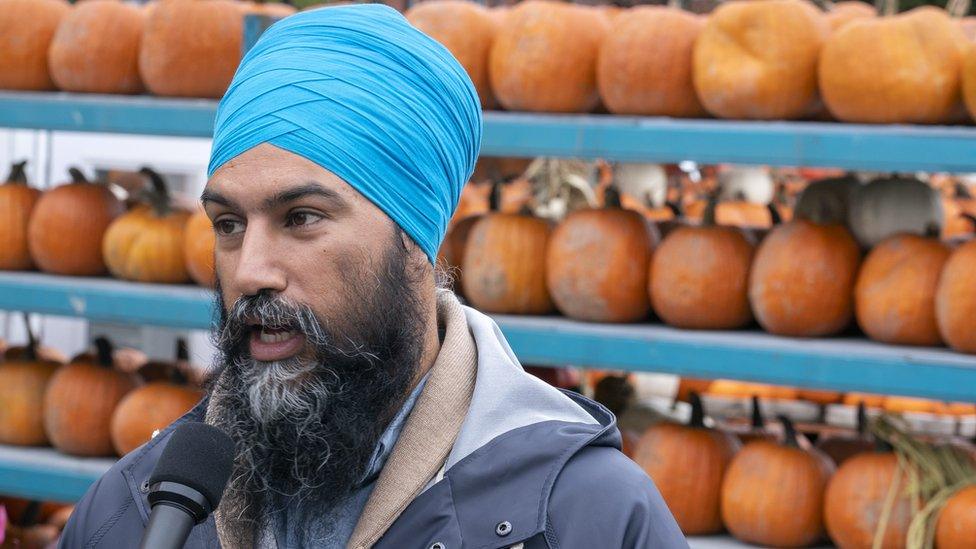
NDP leader Jagmeet Singh speaks English, French and Punjabi, and maintains close ties with the Sikh community
And almost eight million Canadians speak a mother tongue from another country. Of those languages, Mandarin is the most-spoken, with Cantonese a close second and Punjabi a third.
The areas around Toronto and Vancouver have especially rich immigrant communities, with immigrants making up about 70% of the population in some ridings (constituencies).
There, it is common to see Chinese-language election signs in ridings in Richmond, British Columbia or Markham, Ontario.
Special thanks to readers Drewery Dyke, Craig Rice, Kumar Malde, Chris West for submitting questions
- Published2 October 2019
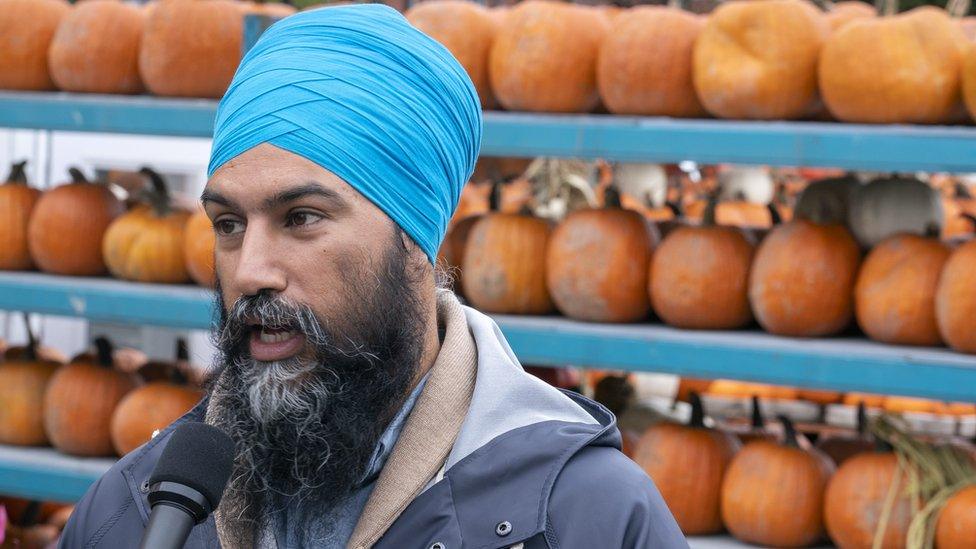
- Published17 October 2019
